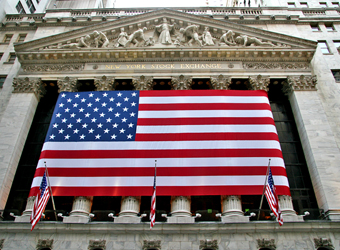The Dow Jones industrial average rose 40 points and finished at a record of 22,872.89, with Johnson & Johnson contributing the most to the gains.
The S&P 500 also posted a record close, rising 0.2 percent to 2,555.24, with real estate leading advancers.
The Nasdaq composite gained 0.25 percent to finish at an all-time closing high of 6,603.55.
The minutes showed that a December interest-rate hike is all but certain despite low inflation levels.
“Consistent with the expectation that a gradual rise in the federal funds rate would be appropriate, many participants thought that another increase in the target range later this year was likely to be warranted if the medium-term outlook remained broadly unchanged,” the Sept. 20 meeting summary said.
Most market participants were already expecting a rate hike in December.
“There is still a good chance they raise rates in December,” Mike Materasso, senior vice president at Franklin Templeton. He added, however, that “inflation has been stubbornly low.”
The central bank kept interest rates unchanged last month, but said it would start to roll off its $4.5 trillion portfolio this month. The Fed amassed most of its holdings during the financial crisis.
“The onus is going to be on the hawks to continue to show a desire to keep raising rates even though inflation keeps falling short of the Fed’s target,” said Robert Tipp, chief investment strategist at PGIM Fixed Income. “Right now, we have two rate hikes priced in through the end of next year.”
Larry Fink, CEO of BlackRock, the largest asset manager in the world, said Wednesday his biggest fear for the market is a policy mistake from the Fed.
“People are assuming another tightening this year and another three next year. Could we see an inverted yield curve like next year or early 2019?” Fink told CNBC’s “Squawk Box.” “We want to avoid an inverted yield curve.”
An inverted yield curve shows short-term interest rates higher than long-term rates.
Equities have been on a stellar run this year. The three major indexes have reached all-time highs and are all up more than 10 percent in 2017. Recently, they have been lifted by solid economic data and renewed hopes of tax reform.
President Donald Trump tweeted about the stock market Wednesday, saying it would grow “by leaps and bounds” if tax reform were accomplished.
Wall Street also looked to corporate news on Wednesday, as earnings season picked up steam. BlackRock and Delta Air Lines both reported quarterly results that beat expectations.
Nick Raich, CEO of The Earnings Scout, said the average earnings and sales growth rates for the 26 S&P 500 companies that had reported as of Wednesday morning were 14.9 percent and 10 percent, respectively.
“Those numbers are probably going to drop once the insurers start reporting, but I think that’s going to be a one-time thing” because of the hurricanes, Raich said. Nonetheless, “this is a very solid start to the earnings season. If you want to go bearish, you don’t want to look to earnings right now.”
Other companies scheduled to report this week include big banks like Citigroup, JPMorgan Chase and Bank of America.
“This year might be the first year in the past six or seven where all the banks focus on growth and not cost-cutting,” said Wei Ke, head of the North American financial services practice at Simon-Kucher. “What I’ve seen this year is banks having cut most of the costs they could cut.”
Source: CNBC


